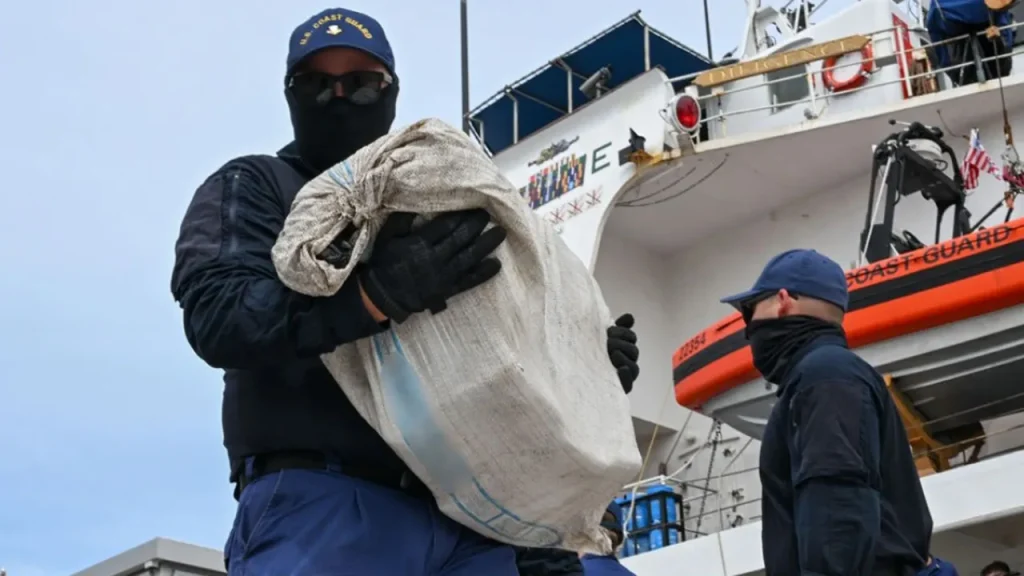Record Cocaine Seizure Prevents Deadly Drug Crisis Across America
In a milestone achievement against drug trafficking, a Florida-based multi-agency task force has intercepted one million pounds of cocaine during the 2025 fiscal year—enough lethal doses to potentially kill every American. This unprecedented seizure, announced by the Joint Inter-Agency Task Force–South (JIATF-S) under U.S. Southern Command leadership, represents a devastating blow to transnational criminal organizations and their deadly trade. Working alongside the U.S. Coast Guard and international partners, the task force has systematically disrupted drug flows through the critical “transit zone” connecting South America, Central America, and the Caribbean. To put this massive seizure into perspective, officials explained the cocaine haul would fill approximately 42 dump trucks and contains nearly 378 million lethal doses that have been prevented from reaching American streets.
The financial impact of this interdiction effort cannot be overstated, with officials confirming to Fox News Digital that cartels and narco-terrorist networks have been denied over $11.34 billion in revenue. JIATF-S operates across an expansive 42 million square mile area stretching from the Eastern Pacific to the Western Atlantic, encompassing international waters from north of the Caribbean Antilles to Cape Horn at South America’s southern tip. This region has historically served as a major corridor for trafficking not just drugs, but also weapons, cash, and human beings. The sophisticated criminal networks operating in this zone have developed complex methods to exploit geographical advantages and evade detection, making this record seizure all the more significant as a demonstration of improved intelligence and interdiction capabilities.
The Trump administration has made combating these criminal networks a cornerstone of its national security strategy, escalating military presence and operations in the Caribbean as part of an aggressive counter-narcotics campaign. In recent months, U.S. forces have conducted multiple operations targeting smuggling vessels, representing a significant escalation in America’s approach to stemming the flow of cocaine and other illicit substances into the United States. This tactical shift reflects President Trump’s broader commitment to addressing the drug crisis through direct confrontation with the sources and supply chains of narcotics. February marked a notable policy development when Trump designated several criminal organizations, including Tren de Aragua and the Sinaloa Cartel, as foreign terrorist organizations, providing law enforcement with expanded authorities to combat these groups.
The fight against drug trafficking has increasingly focused on Venezuela’s government, with the Justice Department offering a substantial $50 million reward for information leading to the arrest and conviction of Venezuelan President Nicolás Maduro. U.S. authorities have accused Maduro of playing a leadership role in the Cartel of the Suns, a drug-trafficking network allegedly comprised of senior Venezuelan government and military officials. According to State Department allegations, “As he gained power in Venezuela, Maduro participated in a corrupt and violent narco-terrorism conspiracy with the Revolutionary Armed Forces of Colombia (FARC), a designated Foreign Terrorist Organization.” Prosecutors claim Maduro facilitated multi-ton shipments of FARC-produced cocaine and directed his cartel to provide military-grade weapons to the terrorist group, establishing a dangerous nexus between narcotics trafficking and terrorism that directly threatens American security.
The administration’s aggressive posture escalated in August when President Trump approved the deployment of several U.S. Navy guided-missile destroyers to strengthen counter-narcotics operations in the Caribbean—a move that sparked immediate tensions with Venezuela. Maduro responded defiantly, declaring that Venezuela was prepared to resist what he characterized as “an extravagant, unjustifiable, immoral and absolutely criminal and bloody threat.” The Venezuelan leader has consistently framed American counter-narcotics efforts as part of a broader campaign to undermine and ultimately overthrow his government, creating a volatile diplomatic situation alongside the operational challenges of interdicting drug shipments. This confrontational dynamic highlights how counter-narcotics operations increasingly intersect with broader geopolitical tensions in the Western Hemisphere.
As the fiscal year concludes, the record-breaking cocaine seizure represents not just a tactical victory but a potentially life-saving achievement in the ongoing battle against drug trafficking. “By disrupting the flow of these deadly drugs, JIATF-S is saving lives and protecting our homeland,” the agency noted in its announcement. Officials emphasized that the one million pounds of cocaine intercepted does not even include separate strikes conducted against Venezuelan narco-terrorist operations, suggesting the full impact of counter-narcotics efforts may be even greater than the headline figures indicate. With fentanyl and other synthetic opioids continuing to devastate American communities, these interdiction efforts represent a critical front line in protecting public health and safety while simultaneously weakening the criminal networks that profit from addiction and death.


